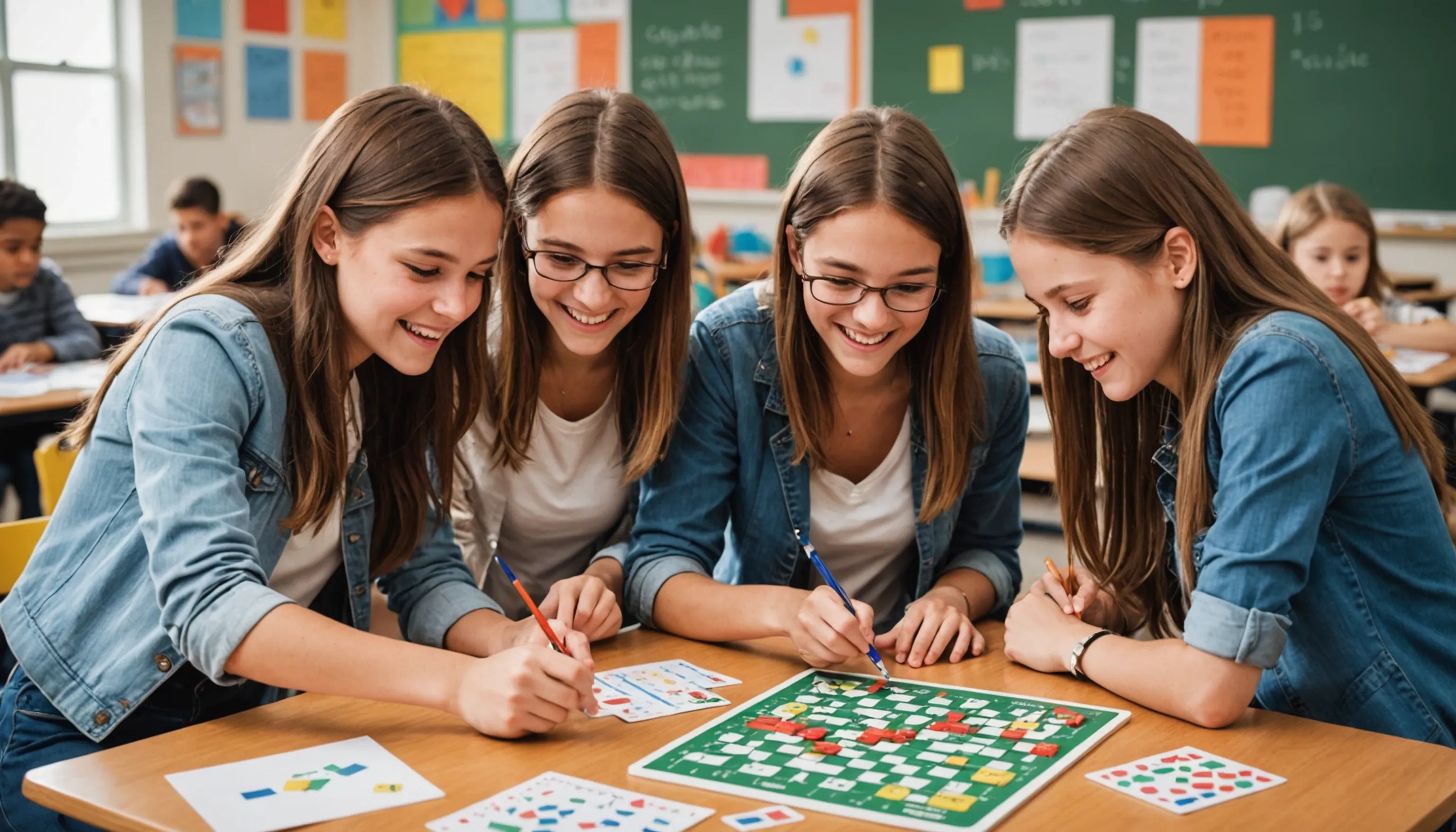How to Enjoy Math
 HvWHenry van Wagenberg
HvWHenry van Wagenberg
How to Help Teenagers Enjoy Math
Helping teenagers enjoy math starts with fostering a positive attitude toward the subject. Encourage them to see math as a valuable skill rather than a chore. Start by highlighting its importance in everyday life, such as budgeting, cooking, or sports statistics.
Utilize engaging resources like interactive apps and educational websites that transform math into an exciting experience. Additionally, involve them in discussions about their interests and find ways to connect math concepts to those interests. Finally, celebrate their achievements, no matter how small, to build confidence and a love for learning.
Understanding the Importance of Math
Understanding the importance of math goes beyond just numbers and equations; it plays a critical role in everyday life and various careers. Math is a foundational skill that aids in critical thinking, problem-solving, and decision-making. By grasping mathematical concepts, teenagers can improve their analytical skills, which are essential in navigating the complexities of the world.
In academic settings, a solid understanding of math is often required for subjects such as science, technology, engineering, and mathematics (STEM). These fields are rapidly growing and offer numerous career opportunities. For example, engineers, data analysts, and healthcare professionals rely heavily on math to perform their jobs effectively. By recognizing math's relevance to future career paths, teenagers may feel more motivated to engage with the subject.
Furthermore, math is essential for financial literacy. Understanding basic math concepts enables teenagers to manage their money wisely, make informed decisions about savings and investments, and plan for future expenses. For instance, knowing how to calculate percentages can help them understand discounts and interest rates.
Finally, math fosters a sense of accomplishment and boosts self-esteem. As teenagers overcome challenges in math, they gain confidence in their abilities. This confidence can translate into other areas of their lives, encouraging them to tackle challenges head-on. By highlighting these aspects, parents and teachers can help teenagers appreciate the importance of math and inspire a lifelong love for learning.

Creating a Positive Learning Environment
Creating a positive learning environment for teenagers is crucial in fostering their interest in math. A supportive atmosphere encourages students to express their thoughts freely, ask questions, and take risks without the fear of judgment. Start by establishing clear expectations and a structured routine that helps students feel secure and focused.
Incorporate various teaching methods to cater to different learning styles. Some teenagers may thrive in collaborative settings, while others prefer independent work. Integrating group activities, hands-on projects, and visual aids can make math more relatable and engaging. For instance, using real-world problems can help students see the practical applications of math in their everyday lives.
Additionally, promoting a growth mindset is essential. Encourage teenagers to view challenges as opportunities for growth rather than obstacles. Remind them that making mistakes is a natural part of the learning process, and each error offers valuable lessons. Celebrate their efforts and progress to reinforce this mindset.
Furthermore, create a welcoming and inclusive environment. Ensure that all students feel valued and respected, regardless of their math proficiency. Provide personalized support to those struggling and offer advanced challenges to keep more proficient students engaged.
Finally, maintaining open communication with students is vital. Regularly check in with them to understand their feelings about math and address any concerns they may have. By fostering a positive learning environment, parents and teachers can significantly enhance teenagers' enjoyment and success in math.
Fun Ways to Make Math Engaging
Making math engaging for teenagers can be achieved through fun and interactive methods. Incorporating games and puzzles, such as math scavenger hunts or escape room challenges, can spark interest and excitement. Utilize technology by introducing educational apps that turn math practice into a game-like experience.
Hands-on activities, like cooking or crafting, can also provide practical applications of math concepts. For instance, measuring ingredients can reinforce fractions and proportions. Additionally, organizing math-themed competitions, like trivia contests or math relays, can motivate students while fostering a sense of teamwork and camaraderie.

Incorporating Games and Puzzles
Incorporating games and puzzles into math lessons can significantly enhance teenagers' engagement and enjoyment of math. These interactive tools transform traditional learning into a fun, dynamic experience. Games create an environment where students can explore mathematical concepts in a relaxed setting, allowing them to learn through play.
One effective method is to use board games that require strategic thinking and mathematical calculations. Games like Monopoly or Settlers of Catan encourage players to utilize addition, subtraction, and resource management while competing for victory. These games help students see the practical applications of math in decision-making.
Additionally, digital math games and apps have become increasingly popular. Platforms like Kahoot! and Prodigy allow students to participate in interactive quizzes and challenges that reinforce math skills while adding an element of competition. This gamification approach not only motivates students but also provides instant feedback, making learning more effective.
Puzzles, such as Sudoku and logic problems, are another excellent way to develop critical thinking and problem-solving skills. These activities encourage students to think analytically while also enhancing their number sense. Introducing math-based escape rooms in the classroom can further amplify excitement; students work together to solve problems and unlock clues to “escape,” promoting collaboration and teamwork.
By integrating games and puzzles into math education, teachers can create a vibrant learning atmosphere that fosters curiosity and a positive attitude toward the subject.
Using Real-Life Applications of Math
Using real-life applications of math can significantly enhance teenagers' understanding and appreciation of the subject. When students see how math relates to their daily lives, it transforms abstract concepts into tangible skills. This approach not only boosts engagement but also helps them understand the relevance of math in various contexts.
One effective way to illustrate real-life applications is through budgeting and financial literacy. Teaching teenagers how to create a budget, manage expenses, and calculate savings can empower them with essential life skills. For example, discussing how to plan a budget for a trip allows them to apply addition, subtraction, and percentages in a meaningful way.
Another practical application is through cooking and baking. Recipes often require measurements, conversions, and proportions, making them excellent tools for reinforcing fractions and ratios. By involving teenagers in meal preparation, they can practice these math concepts while enjoying the process.
Additionally, sports statistics provide a fun avenue for applying math. Analyzing player performance, calculating averages, and understanding scoring can engage students who are passionate about sports. This not only makes math relevant but also shows how it intersects with their interests.
Incorporating technology can further enhance these applications. Using apps that track personal fitness goals or financial expenses allows students to engage with math in a digital landscape. By consistently highlighting the real-world importance of math, educators can inspire teenagers to value the subject and cultivate a lifelong appreciation for learning.
Encouraging Collaborative Learning
Encouraging collaborative learning in math can significantly enhance teenagers' understanding and enjoyment of the subject. When students work together, they share diverse perspectives and strategies, which fosters deeper comprehension. Group activities, such as math projects or problem-solving challenges, promote teamwork and communication skills.
Assigning roles within groups can also ensure active participation from all members. By collaborating on math tasks, teenagers can build confidence as they learn from one another and tackle challenges collectively. This supportive environment not only makes learning more enjoyable but also helps students develop essential social skills that benefit them in all areas of life.
Group Study Sessions
Group study sessions are an effective way to enhance teenagers' understanding and enjoyment of math. These collaborative environments allow students to share knowledge, clarify doubts, and tackle challenging concepts together. When teenagers study in groups, they can approach problems from different angles, fostering a deeper understanding of the material.
One of the key benefits of group study sessions is the opportunity for peer teaching. Students often feel more comfortable asking questions and seeking help from their peers than from teachers. When one student explains a concept to another, it reinforces their understanding and solidifies their knowledge. This reciprocal teaching method not only boosts confidence but also encourages active engagement with the subject.
Additionally, group study sessions can make math more enjoyable. Incorporating games and challenges during these sessions can add a fun element, turning study time into an exciting experience. For instance, setting up friendly competitions or math relays can motivate students to participate actively while reinforcing their skills.
To maximize the effectiveness of group study sessions, it's essential to establish clear goals and a structured agenda. This helps keep the focus on the material and ensures that all participants are on the same page. Encouraging a positive atmosphere where everyone feels valued and respected fosters collaboration and creativity.
Ultimately, group study sessions not only enhance mathematical skills but also promote social interaction and teamwork, skills that are invaluable in both academic and real-world contexts.
Online Math Communities and Resources
Online math communities and resources have become essential tools for teenagers looking to improve their math skills and connect with others who share similar interests. These platforms provide a wealth of information, support, and opportunities for collaboration, making math more accessible and engaging.
Some key benefits of participating in online math communities include:
- Access to Resources: Many websites offer free tutorials, practice problems, and videos that cover a wide range of math topics. Sites like Khan Academy and Coursera provide structured courses that can help students grasp challenging concepts.
- Peer Support: Online forums and social media groups enable students to ask questions, share insights, and seek help from peers and educators. Platforms like Reddit and Discord host math-focused communities where students can collaborate and discuss various topics.
- Tutoring Opportunities: Many online platforms connect students with tutors who can provide personalized assistance. Websites like Wyzant and Chegg offer access to qualified tutors who can help clarify concepts and solve problems.
- Engaging Challenges: Websites like Art of Problem Solving (AoPS) offer math competitions and challenges that encourage critical thinking and problem-solving skills while making learning enjoyable.
Participating in these online communities can motivate teenagers to take ownership of their learning and explore math beyond the classroom. By leveraging these resources, students can enhance their skills, build confidence, and develop a lifelong passion for math.
